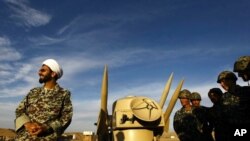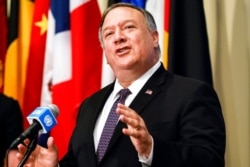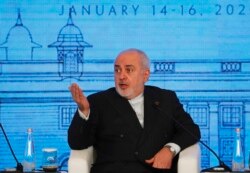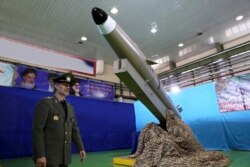The United States has rejected the expiration of an international arms embargo on Iran, saying it will use its domestic laws to punish any weapons supplier dealing with the Islamic Republic.
"No nation that desires a peaceful Middle East should contemplate arms sales with Iran," U.S. Secretary of State Mike Pompeo said Sunday on Twitter. "We are prepared to use domestic authorities to sanction individuals or entities contributing to these arms sales."
Another statement issued Saturday by Pompeo gave a different interpretation of the arms embargoes, saying that "virtually all U.N. sanctions on Iran returned" on Sept. 19 after Washington triggered the "snapback" provision of the 2015 Joint Comprehensive Plan of Action (JCPOA), commonly known as the Iran nuclear deal.
Other world powers, including America's European allies, disagree with the U.S. interpretation, saying that by withdrawing from the JCPOA in 2018, Washington forfeited its right to use the snapback provision of the deal.
Iranian Foreign Minister Mohammad Javad Zarif said the lifting of the arms embargo was a success for his country's diplomacy.
"A momentous day for the international community, which — in defiance of malign U.S. efforts — has protected UNSC Res. 2231 and JCPOA," Zarif tweeted Sunday.
"Today's normalization of Iran's defense cooperation with the world is a win for the cause of multilateralism and peace and security in our region," he added.
No shopping spree
Despite the expiration of the decade-long embargo, some experts doubt that Iran will go on a weapons shopping spree as its economy struggles under crippling U.S. sanctions.
"Iran's difficult economic situation remains the greatest obstacle to its procurement of large-scale, costly weapons," Nicole Grajewski, a fellow with the Belfer Center's International Security Program, wrote in an article published on the center's Russia Matters website.
"It is simply unfeasible for a country facing a crippling economic downturn to afford expensive weapons such as the S-400 or a squadron of fighter jets," she added.
Iran's imported weapon systems largely date back to before the 1979 Islamic Revolution, which resulted in the ouster of the country's pro-Western King Mohammad Reza Pahlavi. Those weapons, experts say, need upgrading now.
Iran Defense Minister Amir Hatami on Sunday, however, boasted about his country's homemade weapons.
"The ground for selling and buying weapons is prepared for the Islamic Republic of Iran, but of course the sales will be more," Iranian state-owned Tehran Times quoted Hatami as saying.
U.S. sanctions
Since its withdrawal from the Iran nuclear deal in 2018, Washington has increasingly imposed sanctions on those trading with Iran. Currently, nearly all key sectors of Iran's oil-based economy are under U.S. sanctions.
The most recent round of sanctions, introduced earlier this month, targeted 18 "major" Iran-based banks. That followed last month's sweeping executive order from President Donald Trump to "restrict Iran's nuclear, ballistic missile and conventional weapons pursuits."
Russia and China are viewed as the most likely arms suppliers to Iran as both countries have publicly stated their willingness to sell weapons to Tehran.
But experts are split on whether U.S. sanctions have the power to deter Moscow and Beijing from signing defense contracts with Iran.
"If anything, the Trump administration's opposition to arms sales to Iran could incentivize the Russians and Chinese to announce new transfers, which would probably take some time to implement," Barbara Slavin, director of the Future of Iran Initiative at the Atlantic Council, told VOA.
On the other hand, Behnam Ben Taleblu, a senior fellow at the Washington-based Foundation for Defense of Democracies (FDD), says the threat of sanctions by the Trump administration along with previous authorities "constitute robust non-kinetic tools to deter and/or punish sales or transfers of weapons."
Even though the most recent designations include a "military-affiliated bank," some experts suggest their impact on the ground would be symbolic.
"Iranian officials have already admitted that their interaction with the global system has been blocked for months," Alex Vatanka, an Iran analyst at the Middle East Institute in Washington, told VOA. "So more sanctions would not necessarily worsen their situation as the governor of central bank of Iran, [Abdolnaser] Hemmati, has made it clear that almost all companies and countries are staying away from dealing with Iran."
Humanitarian exemptions
Washington says its sanctions include exemptions that would permit sending humanitarian assistance to the Iranian people as they are battling the coronavirus pandemic.
"Our sanctions programs will continue until Iran stops its support of terrorist activities and ends its nuclear programs," U.S. Treasury Secretary Steven Mnuchin said on Oct. 8 when introducing the latest round of sanctions. "Today's actions will continue to allow for humanitarian transactions to support the Iranian people."
Iranian officials claim that the U.S. designation of Iranian banks is aimed at "starving" the Iranian people.
"Amid COVID-19 pandemic, U.S. regime wants to blow up our remaining channels to pay for food and medicine," Zarif said in response to the recent U.S. designations.
Jason Brodsky, policy director of United Against Nuclear Iran, a U.S.-based advocacy group, said the U.S. sanctions would rather help expose Iranian policies that prioritize military adventurism over the well-being of its people.
"Just a few weeks ago," he said, "Iran's health minister complained that only a small portion of promised funds from the National Development Fund (NDF), which is controlled by Iran's supreme leader, had been received for combating the coronavirus."
"The NDF has been used in the past to fund Iran's malign activity throughout the region," Brodsky said.







